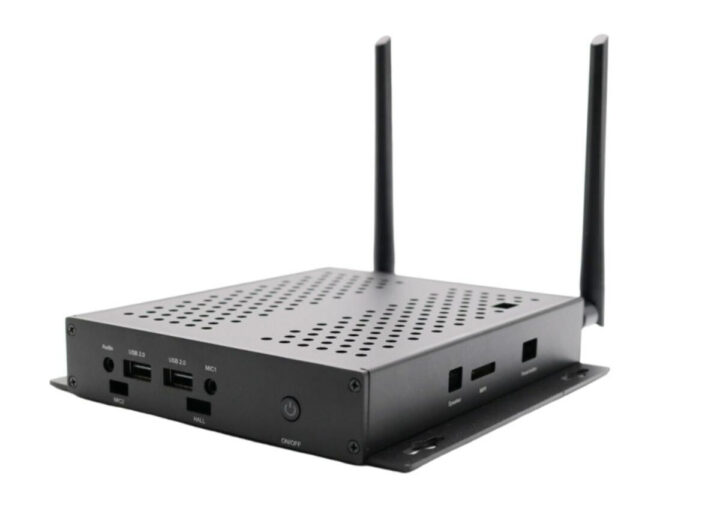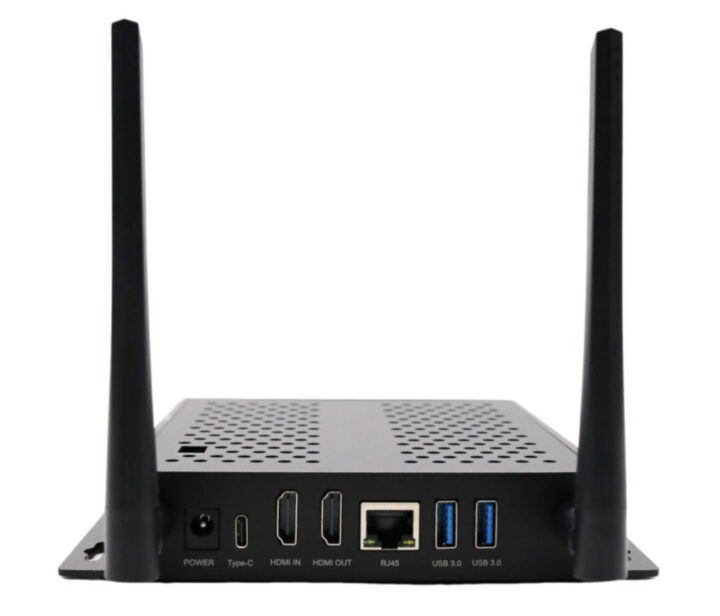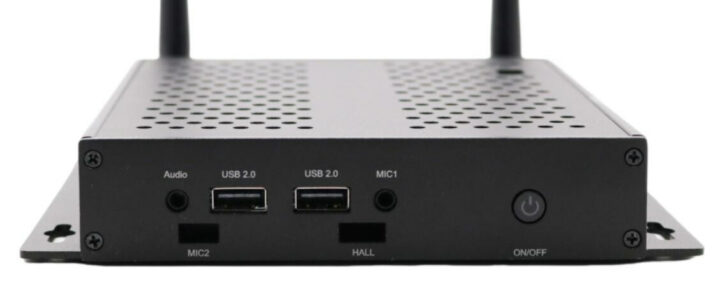Mekotronics LS1200 is a mini PC powered by a MediaTek Genio 1200 (MT8395) octa-core Cortex-A78/A55 processor with a 4.8 TOPS NPU, and especially suited to live streaming applications.
The system, housed in a metal enclosure, is offered with an unspecified amount of LPDDR4x memory and eMMC flash, HDMI input and output, an eDP (Embedded DisplayPort) interface, a Gigabit Ethernet RJ45 port, WiFi and Bluetooth connectivity, and four USB host ports.
Mekotronics LS1200 specifications:
- SoC – MediaTek Genio 1200 (MT8395) octa-core processor with
- CPU – 4x Cortex-A78 cores @ 2.2GHz, 4x Cortex-A55 cores @ 2.2GHz
- GPU – Penta-core Arm Mali-G57 GPU @ 880MHz with support for OpenGL ES 3.2/2.0/1.1, Vulkan 1.1/1.0, OpenCL 2.2,
- AI accelerator – 4.8 TOPS dual NPU with support for TensorFlow and Caffe models
- DSP – HiFi 4 audio DSP
- VPU
- Encoding up to 4Kp60 with H.265/HEVC
- Decoding up to 4Kp90, AV1, VP9, HEVC, H.264 codecs supported
- System Memory – LPDDR4x
- Storage – eMMC
- Video Output
- HDMI 2.0 port up to 4Kp60
- eDP connector and touchscreen interface (accessible from the side of the device)
- Video Input
- HDMI input
- Internal MIPI CSI connector
- Audio – 3.5mm audio jack, 3.5mm microphone jack, built-in microphone
- Networking
- Gigabit Ethernet RJ45 port
- Dual-band WiFi and Bluetooth with 2x external antennas
- USB – 2x USB 3.0 ports, 1x USB type-C port, 2x USB 2.0 ports
- Misc – Power button, Hall sensor
- Power Supply – DC power jack
- Dimensions – TBC (industrial grade aluminum shell)
The system is said to run the Android 11 operating system, but the product description also mentioned it ” supports a variety of operating systems with stable and reliable performance”.
The company did not provide information about pricing and availability, but considering the specifications are not complete and ADLINK’s I-Pi SMARC 1200 development kit, based on the same Genio 1200 processor, is still shown as “preliminary”, the Mekotronics LS1200 is probably not available yet either. A few more details may be found on the product page.

Jean-Luc started CNX Software in 2010 as a part-time endeavor, before quitting his job as a software engineering manager, and starting to write daily news, and reviews full time later in 2011.
Support CNX Software! Donate via cryptocurrencies, become a Patron on Patreon, or purchase goods on Amazon or Aliexpress. We also use affiliate links in articles to earn commissions if you make a purchase after clicking on those links.







The big cores are 2 generations better than the RK3588. Wonder if MediaTek got a good ARM Linux support.
AFAIK, Cortex A-77 is not that good. So we could say that it’s 1 generation better than RK3588’s Cortex A-76. Too bad it’s Mediatek SoC. Meaning: no linux for you.
> Too bad it’s Mediatek SoC. Meaning: no linux for you
Not true for all MediaTek business units. See the upstreaming efforts around their router SoCs and for exampling them partnering with BayLibre for their ‘AIoT’ offerings…
Also their Chromebook SoCs have pretty good upstreaming efforts. The MT8395 looks very similar to their MT8195 Chromebook SoC; I think many drivers will be usable without significant changes. The word Android is a bit of a red flag, though.
I see. But from what i heard, the jump from A76 to A77 is some of the biggest generational jump. While the jump from A75 to A76 and A77 to A78 are more of a standard/ordinary jump. But i maybe wrong. Anyway, hope we can get better support for Linux from MediaTek and others in the future. The more chip vendors supporting Linux, the merrier.
It does seem like a bunch o’ work to compile Android 13 on it. Is there a RealTek N00B pack like Capstone/Unicorn to flush out all the undisclosed opcodes and whatnot, or is the idea to license the boxed RealTek CN Rust compiler…or simply use GPT3 and hope it’s trained?
Is there no true optimized binary (say, LibC or LINPAC20) for these chips?
It always depends on how you want to characterize the changes. The way I’d describe them, there were significant changes in the previous generations (new microarchitecture in Cortex-A73, new ISA and bus interface in Cortex-A75, new microarchitecture again in Cortex-A76), but between Cortex-A76, -A77, -A78 -X1 and Neoverse N1 I only see optimizations of the same basic design instead of generational jumps.